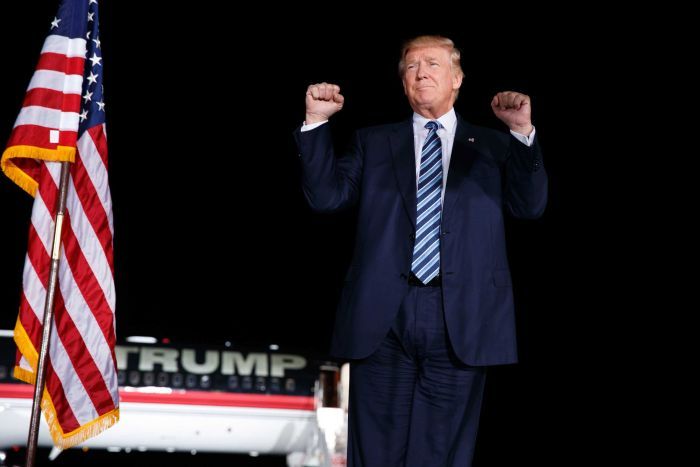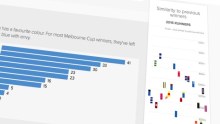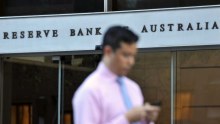Donald Trump predicts a 'beyond Brexit' election win, but pollsters say he's already lost
Updated
 Photo:
Donald Trump arrives to speak to a campaign rally in Kinston, North Carolina on Wednesday. (AP Photo: Evan Vucci)
Photo:
Donald Trump arrives to speak to a campaign rally in Kinston, North Carolina on Wednesday. (AP Photo: Evan Vucci)
It's done. It's over. Why go on? Republican presidential candidate Donald Trump has lost this election.
Hang on — what?
The majority of polls have him trailing Hillary Clinton by at least five points and headlines across the political pages reveal panicked Republicans are piling money into their Senate and House races.
But pundits and political analysts have written Mr Trump off repeatedly over the past year, only for him to survive and thrive.
Now the US election is well into its final fortnight and that margin of five points is a deficit that no-one in US presidential history has ever recovered from to win.
"Historically, for the presidential elections held in the last 30 or 40 years for which we've had a lot of polling, usually this period in October is the most stable," explains polling heavyweight Mark Blumenthal.
Mr Trump and his campaign manager have both accepted that they are behind but he continues to use the B-word — Brexit — as a rallying cry to his supporters that pollsters do not always get it right.
In North Carolina: "I think we're going to have beyond Brexit — I think we'll call it beyond Brexit."
In Colorado: "I don't believe these polls. They're sort of good, actually, if people come out and vote. They're very nervous. I have a feeling this is another Brexit."
And in Pennsylvania: "We will win. We will shock the world. This is going to be Brexit-plus."
Except US presidential elections are different, but we'll come to that in a minute.
Team Trump acknowledge they're behind
If you look at the aggregate — the combination of the top polls — month by month since June, Mr Trump has not always been far behind.
He did get off to a bad start in June after he sacked his first campaign manager and attacked the impartiality of a judge with Mexican ancestry.
By July he reached his height of popularity in this race on the back of the Republican Convention. Then in August Mr Trump plummeted as he attacked the family of a dead US soldier.
By mid-September he had clawed his way back to striking distance, only for Mrs Clinton to defeat him in the first debate. And then came the Access Hollywood video and more than 10 women accusing him of sexual assault.
He has been down ever since, a position his campaign now accepts.
"We are behind. She [Mrs Clinton] has some advantages — $66 million ad buys just in September, most are negative against Donald Trump," says Trump campaign manager, Kellyanne Conway.
"I guess we're somewhat behind in the polls, but not by much," Mr Trump said in a radio interview this week.
"So I think whether it's Brexit of beyond Brexit we're going to have a Brexit situation."
Survey Monkey's head of election polling, Mark Blumenthal, disagrees.
"The one thing about the Brexit example is that the polls there were actually pretty close, and the result was reasonably close," he told ABC's 7.30 program.
"It was just that the polls on the last weekend tended to show the stay vote ahead by a point or two and it ended up losing by three or four.
"I think it was in the real-world error that polling is subject to and, you know, if we were looking at one or two points separating Clinton and Trump, I'd say we'd be well within that historical potential for polling error."
Hidden vote not enough to give Trump the election
 Photo:
Republican pollster Frank Luntz said Hillary Clinton's campaign was much more organised than Donald Trump's. (ABC News)
Photo:
Republican pollster Frank Luntz said Hillary Clinton's campaign was much more organised than Donald Trump's. (ABC News)
Another man who has also spent three decades in the polling business is Republican royalty Frank Luntz.
"I believe there is a hidden vote, but I believe it is tiny — 1 or maybe 2 per cent, that's it," he told 7.30.
"Those that support Trump do so in a very loud, vocal way.
"They do so because they want to make a statement that they don't like the direction of the country and they don't like the current incumbents on either side of the aisle.
"But the idea that there's enough of a hidden vote to give him an election, that pollsters would get it wrong by 6 or 7 per cent — well it happened in 1948, it hasn't happened since then.
"There may be 1 or 2 per cent of Americans who won't tell the truth, who are too embarrassed by Trump to acknowledge they're supporting him, but there is also a cross-current on the Clinton side.
"Hillary's got a much better organisation, she's got phone calls, emails, text, data, they're spending millions of dollars to bring out the vote and Donald Trump is spending nothing because he's too cheap and doesn't want to engage.
"So, whatever he might have got from a hidden vote will be matched by her strength in terms of her organisation."
Mr Trump has reportedly spent more on "Make America Great Again" hats than on internal polling, according to Bloomberg.
Democrats wheel out the big guns
Mr Trump often hails the size of his rallies as a sign of his success, but political scientists say it just does not equate to votes. And getting people out to the ballot box is half the battle.
"You see Donald Trump go give rallies that are often not even in battleground states, much less in places where there's likely to be a lot of Trump voters that need a nudge," Dr Mark Sides, Professor of Political Science at George Washington University, told 7.30
"That reflects that they're not doing the same kinds of traditional calculations that a campaign would do."
Sensing a potential wave where they not just win the presidency, but also the Congress, Democrats are spending twice as much money on ads.
Take President Barack Obama. He has filmed 30 ads for Democrats running for seats in the Congress, including two for Florida senator Patrick Murphy — one of them in Spanish.
The President also commands free air time too. Take his appearance on Jimmy Kimmel this week to read mean tweets, including from Mr Trump.
"'President Obama will go down as perhaps the worst president in the history of the United States.' Well, Real Donald J Trump, at least I will go down as a president," he said.
Country 'poisoned' by election vitriol
The Democrats have a self-declared team of stars: the President; Vice President Joe Biden; Senator Bernie Sanders; Senator Elizabeth Warren and of course Michelle Obama.
"People want to hear Michelle Obama. She's seen as a human being first, and First Lady second, and she's an outstanding speaker, she sounds like a real person," Mr Luntz says.
For an otherwise happy warrior for the Republicans, Mr Luntz is now despondent.
"We did a survey a few months ago — 70 per cent of Americans have lost a friend because of politics, more than half say they cannot discuss it at Thanksgiving or Christmas because it will be too toxic at the dinner table," he said.
"That is getting worse, and if you say that the election is rigged or you won't accept the results you're actually playing into it. That's the equivalent of pouring gasoline on the fire."
At this point, does Mr Trump care?
"I don't know," Mr Luntz admits.
"All I know is the impact that it has on the public itself. It's a problem, a real problem.
"I hope no country ever becomes as poisonous in its communications as America has become.
"I have never seen a level of internal resentment and unwillingness to compromise that I see in the Republican Party, and I'm afraid that only days from now it will be all about recrimination and blame rather than understanding and rebuilding.
"I'm afraid that some of the biggest names will be destroyed in an effort to punish those who Trump voters feel were in some ways disloyal or not helpful.
"I don't want to compare this to [George Orwell's novel] 1984 because that's too much, [but] there will be the equivalent of show trials and it's just bad.
"It's bad for the country, the party, people like Speaker Paul Ryan who don't deserve it, and I just hope that other countries with democracies similar to ours don't do the same things that we do."
For insiders like Mr Luntz, the Republican Party is bleeding. And the hardest part to deal with is that the wound was self-inflicted.
Topics: world-politics, us-elections, united-states
First posted





